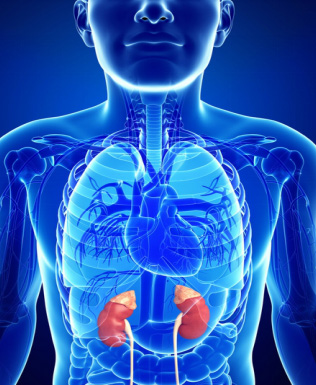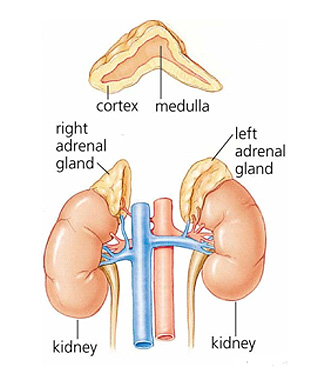

The adrenal glands are also known as endocrine glands and are situated above both kidneys. Adrenal glands provide a very important function in protecting the body against stress. The hormones cortisol, aldosterone, adrenaline, epinephrine, and norepinephrine – and a small fraction of the body’s sex hormones (estrogen and androgens), are produced by the adrenal glands. These hormones affect:
- Control of blood pressure
- Chemical levels in the blood
- Water use in the body
- Glucose usage
- The “fight or flight” reaction during times of stress
- Some of the sex hormones in both men and women
Adrenal Gland problems: causes and symptoms
The adrenal glands are part of a complex system and the range of symptoms is broad. The symptoms can be opposite extremes depending on the overproduction or underproduction of hormones and can range between:
- Weight gain or weight loss
- High or low blood sugar
- High or low blood pressure
- Fatigue, anxiety or headaches
Minimally invasive adrenal surgery
- Diseases of the adrenal gland are relatively rare. The most common reason that a patient may need to have surgery is due to excess hormones produced by benign (non-cancerous) tumors located within the adrenal glands. Fortunately, malignant adrenal tumors are also rare. Most tumors are small and found by chance when a patient gets an CT scan to evaluate another problem. These are called adrenal incidentalomas.
- Laparoscopic adrenalectomy was first described in 1992 by Gagner et al. This minimally invasive surgical approach has established itself as the “gold standard” for the surgical treatment of most adrenal lesions.
Summary of the indications for adrenal surgery
- Primary hyperaldosteronism.
a.Unilateral cortical adenoma causing Conn’s syndrome.
b.Bilateral hyperplasia with unilateral dominance (established by adrenal vein sampling). - Hypercortisolism.
a.Unilateral cortical adenoma.
b.Refractory Cushing’s syndrome (from Cushing’s disease, primary adrenal hyperplasia, or ectopic adrenocorticotropic hormone [ACTH] syndrome). - Pheochromocytoma.
- Unilateral cortical adenoma causing virilization.
- Myelolipoma (in selected situations).
- Adrenal cyst (if refractory or symptomatic).
- Adrenocortical carcinoma.
- Incidentaloma with indeterminate or concerning imaging characteristics.
- Adrenal metastases of other primary cancers (in selected situations).
Advantages for minimally invasive adrenal surgery
- less intraoperative blood loss
- Decreased length of hospital stay
- Decreased use of postoperative analgesics
- Increased rate of return to normal activities of daily living
- Improved cosmesis
- Decreased late morbidity
Surgical approach for minimally invasive adrenal surgery
- Transabdominal approach
- Retroperitoneal approach
